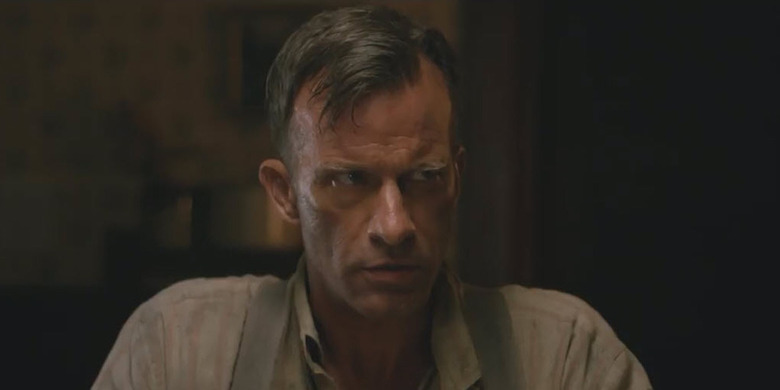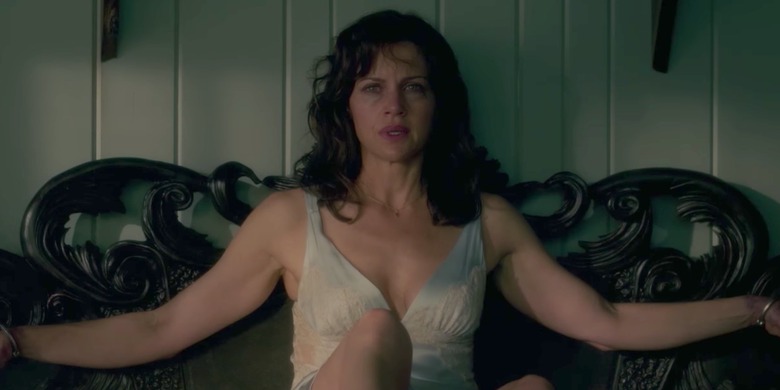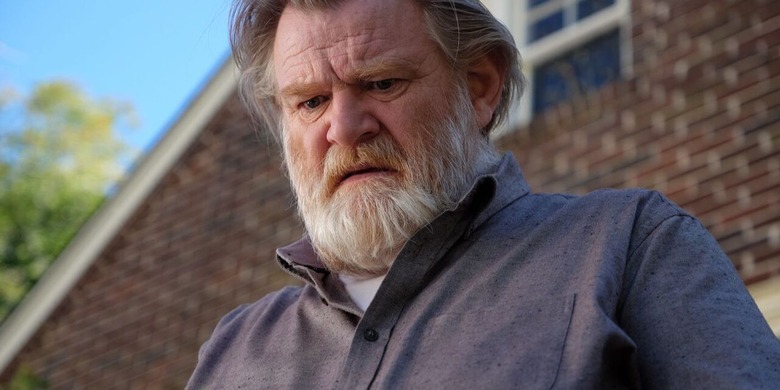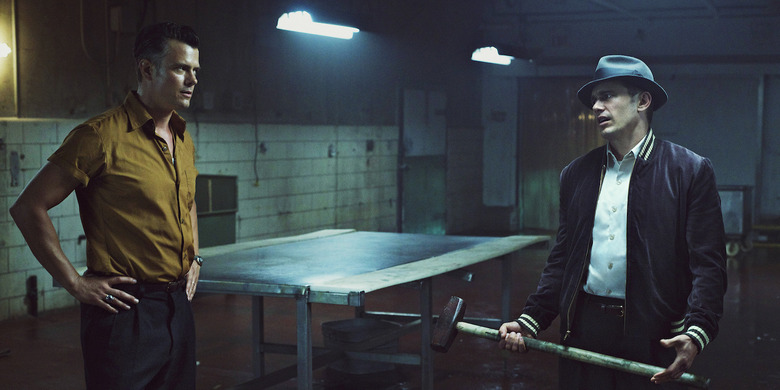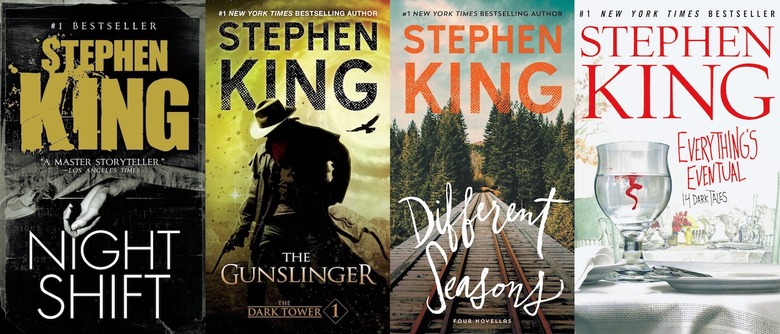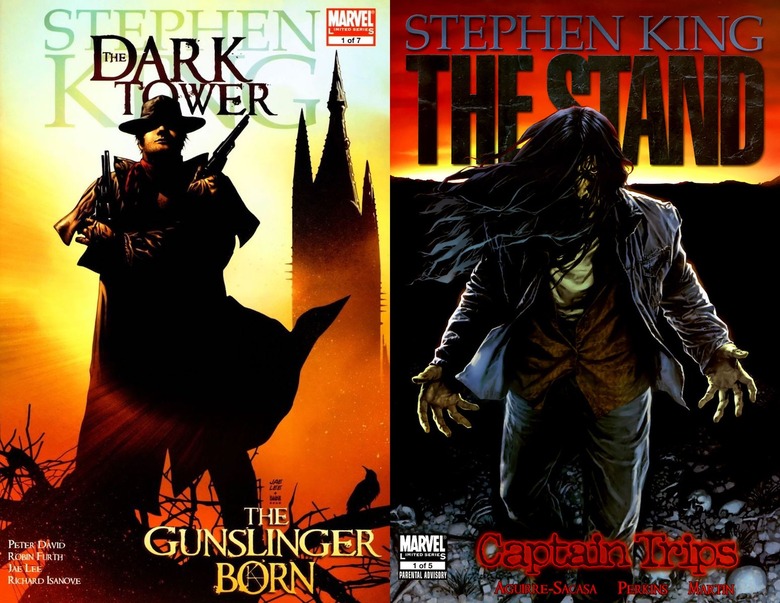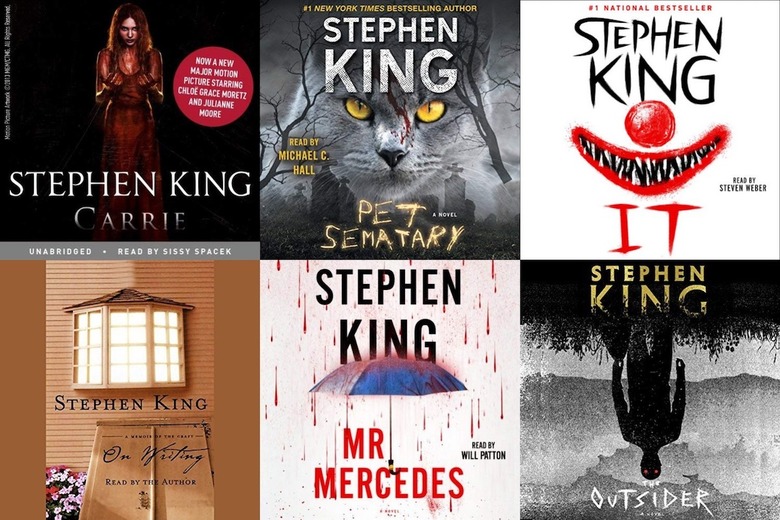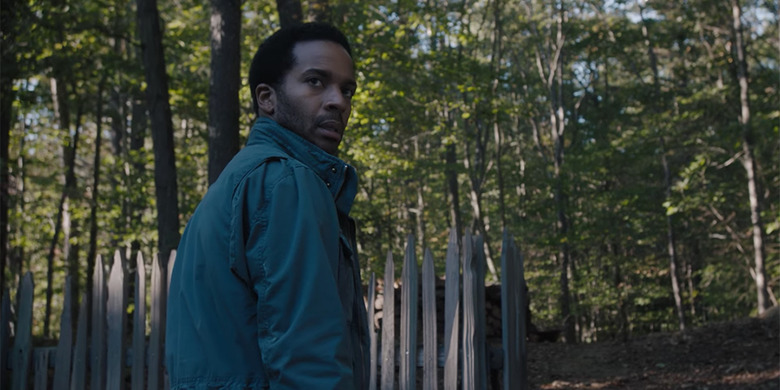8 Pockets Of The Stephen King Multiverse To Explore After 'Castle Rock', From Netflix And Hulu To Books And More
Stephen King recently celebrated his 71st birthday and if you tuned into Castle Rock — Hulu's streaming television series based on characters and settings from the world of King — you might have been going through withdrawals since the show's finale. For fans eager to get caught up in the mania of another mystery-driven show like Lost or Twin Peaks, Castle Rock scratched a very specific itch, getting its hooks into Redditors and inspiring articles likening King to the Charles Dickens of the 21st century.
The effect that Castle Rock had on me is that it made me want to go back and rediscover King's stories across all forms of media, including but not limited to movies. This ranking of the many movies adapted from King's books is a good guide for those who want to go down that particular rabbit hole; but in the same way that Castle Rock teased the existence of other realities beyond the one its characters inhabited, there's a wide world of King content out there and it doesn't look to be letting up its expansion anytime soon.
As it turns out, the Stephen King renaissance extends well beyond movies to a vast multiverse of multimedia, everything from books to audiobooks to comic books and other streaming TV shows and streaming movies. Most of these stories work as standalone narratives but taken as parts of a whole, they also further enrich and enhance each other. Let's venture off the beaten path of theatrical releases and dive deep into eight other corners of the Stephen King multiverse.
1922
The nature of Netflix is such that as movies go direct to streaming, they arguably drop with less fanfare and are forgotten quicker than if they were theatrically released. Last year, on the heels of It's box office conquest, 1922 was the second of two new King adaptations that became available on Netflix. You may have seen it slip into the recommendations on your landing page but with the sheer deluge of content vying for a person's attention at all times, it would be easy for it to get buried or back-burnered on one's to-view list.
If you haven't seen 1922, you should rectify that immediately. Forget the disappointing Dark Tower feature film; this one has that beat by a country mile. Adopting a pair of blue jean overalls and a period Nebraska accent, Thomas Jane gives a performance that makes you forget you're watching Thomas Jane. Ten years prior, Jane had starred in another good King adaptation, The Mist, whose all-timer of an ending wielded hope and fear like twin electrodes in shock therapy for the viewer. On rainy days, my temples still buzz from that movie.
Here, Jane's face has more of a leathery gauntness to it that makes him look like he walked straight out of The Grapes of Wrath. He's playing a very different character this time around. Wilfred James is a farmer who conspires to kill his wife so he can keep her land. Doing so puts him in touch with what he calls "the conniving man," that darkness that dwells in the human heart and makes people do bad things. The flies of Jean-Paul Sartre have nothing on the rats that torment Wilf.
Some of the best King adaptations are based on novellas. 1922 is adapted from one in his 2010 collection Full Dark, No Stars. This is Stephen King by way of There Will Be Blood. It's not just the gothic title card lettering that brings that lofty comparison to mind, either. At times, the dissonant strings and percussion in the score by Mike Patton of Faith No More make the haunted soundscape of 1922 sound like it's comprised of lost tracks from Johnny Greenwood's There Will Be Blood score. We could probably devote another whole section here just to film scores that provide good background music for King fans, such as this one and Thomas Newman's score for The Shawshank Redemption.
Gerald's Game
Also available on Netflix is Gerald's Game, where it's the wife this time who is the main character, not the husband. Jessie Burlingame (Carla Gugino), actually seems leery of her husband, Gerald (Bruce Greenwood), even before he handcuffs her to the bed in a secluded lake house. An attempt to spice up their love life with bondage quickly fails and Jessie is left trapped in her nightgown when Gerald suddenly drops dead of a heart attack at the worst possible time. This sets into motion the movie's game of psychological horror.
Gerald's Game unrolls its nightmare scenario like a stage play, putting Jessie through the wringer physically, mentally, and emotionally as she struggles to survive. Gerald is dead but that doesn't stop him (or another version of Jessie herself) from appearing to Jessie in visions. There's also the terrifying figure of the "Moonlight Man," a monster who may or may not be under Jessie's bed and in the shadowy corners of her room. Speaking in a low whisper, Jessie's hallucination of Gerald tells her:
"People are safe from ghouls and ghosts ... in the daylight and they're usually safe from them at night, if they're with others. But a person alone in the dark, women alone in the dark, are like open doors ... and if they scream for help, who knows what might answer."
Like 1922, which is set in the same town where Mother Abigail lived in The Stand, Gerald's Game overlaps with other King works, alluding most strongly to Dolores Claiborne (there's a flashback scene that's set during the same total solar eclipse), but also working in references to the likes of The Dark Tower, Cujo, and Bag of Bones. "All things serve the Beam." There are even some Easter eggs to director Mike Flanagan's other horror movies like Oculus and Hush. King once called himself "the literary equivalent of a Big Mac and fries," and Gerald's Game leans into the luridness that has left some of his stories dismissed as trashy, junk-food writing. By the end, however, it's clear that this adaptation strives toward a higher meaning.
Mr. Mercedes
Mr. Mercedes is a show that might not have registered as a blip on everyone's radar. Showrunner David E. Kelley (of Ally McBeal fame) received more attention for his HBO series Big Little Lies last year than he did for this King adaptation. AT&T has been trying to get in the game with its own original programming and to that end, Mr. Mercedes premiered last year on the Audience Network, which is available on DirecTV, DirecTV Now, and AT&T U-verse. The show is currently in the middle of its second season and the first couple episodes of both seasons are available to watch for free on the official series website. Many episodes are helmed by frequent Lost director Jack Bender.
With his bushy red beard from 28 Days Later now going white, Brendan Gleeson commands a sturdy presence as retired police detective Bill Hodges. He's the kind of disheveled curmudgeon who is liable to drive home the message of, "Get off my lawn," by storming out of his house with a handgun. The supporting cast of Mr. Mercedes is made up of familiar faces (Mary-Louise Parker and numerous recognizable character actors) and Gleeson has good chemistry with all of them.
Harry Treadaway, who played Victor Frankenstein on Penny Dreadful, now inhabits the role of Brady Hartsfield, a kind of 21st-century Norman Bates who lives in his mother's basement, works at an electronics store, and moonlights as a Mercedes killer. Drawn out over ten episodes, Mr. Mercedes unfolds as more of a character study that seems content to keep itself in cruise control while occasionally putting the pedal to the medal in scenes of horrific violence, like the inciting incident where the titular car plows into a crowd of people at a job fair.
11.22.63
Two years ago, 11.22.63 marked Hulu and Bad Robot's first foray into the Stephen King multiverse and it represented a strong start for the partnership that would eventually lead to Castle Rock. That start was so strong, in fact, that some of the tension in this eight-episode miniseries started to dissipate toward the back half. 11.22.63 is still worth a watch, however, and for lovers of time travel stories, the past has never felt as perilous as it does in this one. That's the show's juicy hook: you can journey into the past, but if you try to mess with the past and change it, it's going to "push back" and mess with you in return.
Teacher turned time traveler Jake Epping (James Franco) learns that the hard way as freak accidents start piling up around his efforts to thwart the assassination of JFK. Before Castle Rock, if you weren't familiar with King's concept of "thinnys" (weak spots in reality where the fabric of the worlds has been worn thin), then the basic premise of a time closet in the back of a retro diner might have seemed silly. As the diner's owner, Al Templeton — who disappears behind the kitchen's swinging doors, only to reappear two minutes later having visibly deteriorated — Chris Cooper really sells it, however, and makes such a time portal believable.
Al's guiding voice establishes firm rules for this universe, like how the portal keeps depositing you at the same exact moment in time and how any changes you have made to the past reset themselves every time you go back. The show employs humor, revealing at one point that Al has been secretly smuggling raw meat back into the present to keep the burgers at his diner cheap. As it turns out, there's also some real intrigue to being a spy from the 21st century, undercover in the 1960s—particularly when your protagonist has to solve one of history's greatest mysteries (who killed Kennedy?) before he can take action.
Jake needs to piece together enough clues to definitively implicate Lee Harvey Oswald. He soon finds himself getting sidetracked by a burgeoning romance with Sadie Dunhill (Sarah Gadon). The wild country of the past feels most dangerous when Jake embarks on a personal mission to save the family of one of his future students from being murdered. This puts him in the orbit of Frank Dunning (Josh Duhamel), a butcher and abusive father who exudes sheer menace as he takes Jake on a tour of a slaughterhouse's "kill floor."
Books, Books, Books
Being such a prolific writer, King's track record as a novelist is inevitably hit-or-miss, and since Hollywood has already adapted and re-adapted many of his most famous novels, the freshness of the story may be lost with some of those when it comes to new potential readers. His magnum opus is The Dark Tower series, which is in development at Amazon and which Castle Rock flirted with heavily in terms of its multiverse-spanning mythology (as related by the Kid, who may or may not have been lying about where he came from). It's quite the commitment to read seven long novels, of course, but not to fear: there are other viable reading options for those who want to get a more manageable sampling of some of King's written work.
Personally, I'm a big proponent of his short story and novella collections. "Rita Hayworth and the Shawshank Redemption" and the Different Seasons collection is what first got me into reading King's books back in middle school. It defied the notion I had of him being solely a horror writer (horror held a stigma in my churchgoing household and King was widely known as the master of the macabre).
The first time I ever met Roland Deschain, the protagonist of The Dark Tower, it was in the novella, "The Little Sisters of Eluria," part of the collection, Everything's Eventual: 14 Dark Tales. That collection also contains King's O. Henry Award-winning short story, "The Man in the Black Suit," as well as the short story "1408," among others. The film adaptation of 1408 starring John Cusack and Samuel L. Jackson is one of the better-reviewed King adaptations but I think the story has it beat simply by leaving more of what happens inside the haunted hotel room up to the imagination.
Another personal favorite is the story "The Boogeyman," which has its own feature film adaptation coming (the fact that it's being written by two of the scribes behind the recent smash horror hit A Quiet Place is encouraging). "The Boogeyman" was part of King's very first short story collection, Night Shift, which also contains the gems "Jerusalem's Lot" and "One for the Road," both of which feed into the overall vampire legend of Salem's Lot that we saw in the 1979 TV movie. With its epistolary form, "Jerusalem's Lot" is a good example of how not every story needs to be translated to the screen. Prose can achieve some things that film can't (at least not in the same way).
Yes, Comic Books, Too!
Again, there might be some King fans out there like me who had the character of Roland Deschain introduced to them in ancillary media before they ever read any of the Dark Tower books. Back in 2007, The Dark Tower: The Gunslinger Born was a big to-do at Marvel Comics. This seven-issue miniseries, which has since been collected into trade paperback form, was plotted by Robin Furth (King's personal research assistant) and scripted by Peter David (whose lengthy Incredible Hulk stint remains perhaps the definitive writer's run on Hulk).
It's the gorgeous illustrations, however, by Jae Lee and Richard Isanove that make this essential graphic novel reading. Turning the pages on The Gunslinger Born is like flipping through a book of lush paintings. The series is a prequel expanding on the flashback material of the fourth Dark Tower novel, Wizard and Glass. The same creative team would return for The Dark Tower: The Long Road Home and The Dark Tower: Treachery, both of which are also available as trade paperbacks.
In 2008, Marvel started a comic book adaptation of The Stand, written by Roberto Aguirre-Sacasa and penciled by Mike Perkins (whose art you might recognize from writer Ed Brubaker's Captain America run. It's the run that re-introduced Bucky Barnes as the Winter Soldier). While there has often been talk of a new live-action adaptation of The Stand, we've yet to see one get off the ground, and in the meantime, all we've got is the 1994 TV miniseries, which gave Randall Flagg a mullet and hasn't necessarily aged all that well.
Here in the comics, King's 1,152-page tome received an equally sprawling adaptation, with the story being spread out over six five-issue mini-series—which have since been collected into an omnibus edition. For the time being, this is perhaps the better visual adaptation of King's classic story of good versus evil on a depopulated Earth.
Books for Your Ears!
King has jokingly said that he suffers from a disease called "literary elephantiasis" (as do I, folks, in case you couldn't tell from the length of this list). Let's face it, not everyone has time nowadays to sit down and read a 1,000-page door-stopper novel of the kind King often writes. That's okay: listeners of the /Filmcast and other podcasts might already be accustomed to multi-tasking (driving, exercising, whatever) with voices playing in the background. If you hop on Audible, there are a wealth of Stephen King audiobooks available there, many of which are gamely read by actors with screen ties to King's work.
On Castle Rock, Sissy Spacek gained Emmy buzz for her performance in episode 7, "The Queen," which followed her character, Ruth Deaver, who may or may not have been shifting through time—reliving the past by projecting her consciousness into her younger body as she struggled with dementia in the present. Spacek starred as the telekinetic, blood-drenched prom queen Carrie in director Brian De Palma's 1976 film. In the audiobook, it's her voice reading King's first novel, acting out the dialogue.
During Castle Rock's run, there were some theories floating around on Reddit about the It-like, 27-year interval between Henry's Deaver's disappearance/reappearance in 1991 and the discovery of the Kid in the prison basement in 2018. Steven Weber played Jack Torrance in the 1997 television version of The Shining and as I wrote in my defense of that miniseries, his voice is perfectly suited to the role of Pennywise the Clown in the audiobook version of It.
To the best of my knowledge, actor Will Patton hasn't appeared in any Stephen King screen adaptations but he does narrate King's newest novel, The Outsider, as well as The Shining sequel, Doctor Sleep, which sees an adult Danny Torrance dealing with inherited alcoholism ("morning-after junkbelly," indeed) before he sobers up and encounters a group of nomadic energy vampires called the True Knot.
Patton also narrates the Bill Hodges Trilogy, starting with Mr. Mercedes. The audiobook version of the trilogy might make a good companion piece to the Mr. Mercedes TV show. Considering the fact that Season 2 of Castle Rock looks to be headed to the Overlook Hotel — not to mention the fact that the book has its own film adaptation on the way, courtesy of the aforementioned Mike Flanagan — the time might really be ripe for giving Doctor Sleep a listen, as well
The only danger with audiobooks is that they can sometimes fade into the background, leaving the listener lost once his or her ear finally tunes back in. Having said that, another listening recommendation (in order to prep for the upcoming film remake) is King's darkest novel, Pet Sematary, read by Dexter actor Michael C. Hall. Aspiring writers might also want to check out On Writing, read by King himself.
Castle Rock
Last but not least, now that all the evidence is in, another viewing option for King fans looking to fill the Castle Rock-shaped hole in their lives would just be to rewatch the show itself. While its ambiguous ending could have perhaps been executed better, the whole gripping first season of Castle Rock played off the perception and subverted perception of Bill Skarsgaard's unaging character, structuring itself almost like a criminal trial against "The Kid"—complete with a penultimate episode that acted as a closing argument of sorts from the defense.
Granted, the essential unknowability of truth, in this case, a man or monster's innocence or guilt, may not always constitute satisfying drama. Some viewers were doubtlessly disappointed (perhaps rightly so) by the show's finale and its seeming lack of answers. The involvement of J.J. Abrams as an executive producer certainly didn't do the show any favors with regards to reviewers dredging up the old "mystery box" comparison. As with Castle Rock, Abrams' name was also attached to Lost as an executive producer, even though he wasn't the actual showrunner on that series or involved in the week-to-week aspects of it. That responsibility was shared by Damon Lindelof and Carleton Cuse, just as the show-running responsibility on Castle Rock is shared by Sam Shaw and Dustin Thomason.
Abrams' slippery "mystery box" metaphor first blew up in the cultural lexicon after his TED Talk, where he discussed the withholding of information and how that could be used as a vital tool for engaging the audience while building backdoor investment in characters. His general stance toward mystery in that talk seemed to be that people don't really want to have the fun ruined by knowing what's inside the mystery box (we do, of course. We just want the reveal to be awesome.) There's certainly an argument to be made that the text of a show that was once alive with theorizing could become dead once it's unlocked with pat explanations. At the same time, it does get old to have secrets teased and then find out that all that mystery was just a MacGuffin used to keep viewers' minds chasing
In its defense, Castle Rock is a little different than Lost in that it uses a legal framework to introduce its central mystery. The main character, Henry Deaver (Andre Holland), is a defense attorney who begins the show arguing to a jury about reasonable doubt. Then he gets called back to his hometown to be the lawyer for this mystery prisoner who's been found in the basement at Shawshank State Penitentiary. Over the course of ten episodes, the case against Skarsgaard's creepy, so-called "Kid" mounts.
Now we, the audience, are left to be the jury. We can review the basic facts of the case as presented throughout the first season, parsing the clues along with Deaver. Then it falls upon us to decide whether we believe the Kid is guilty or not (and if so, to what degree).
"Do you hear it now?"

